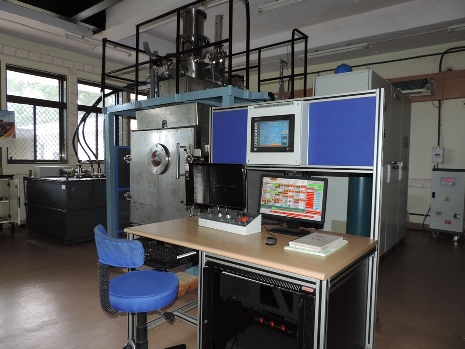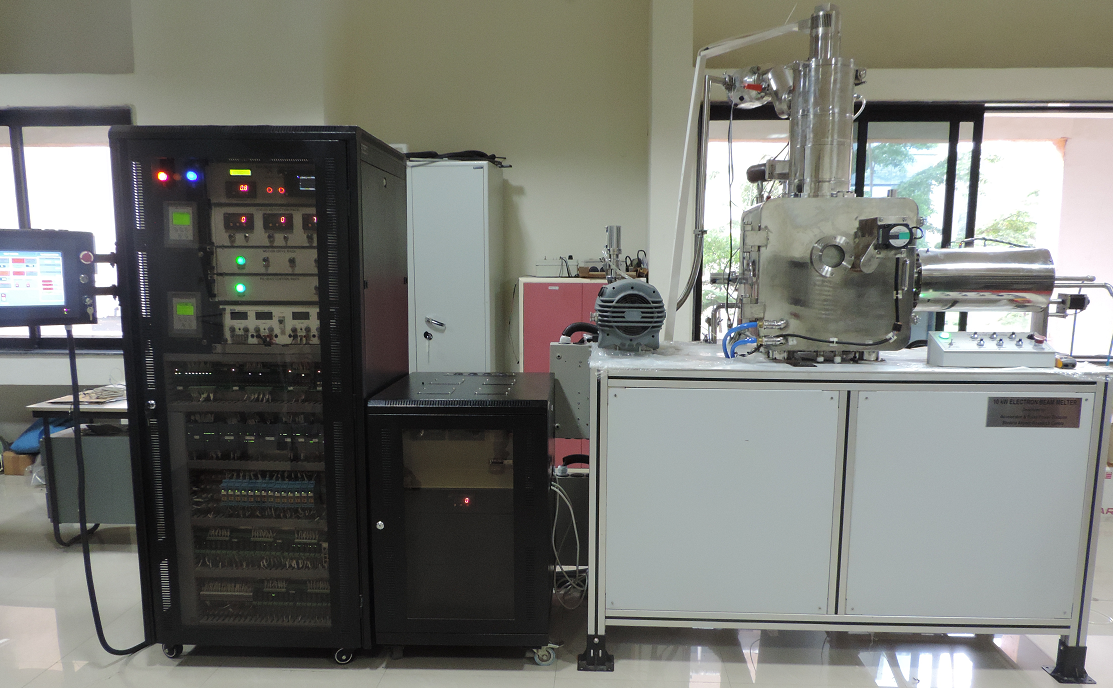2 kW Electron Beam Welding Machine
2 kW Electron Beam Welding Machine
1 2 kW Electron Beam Welding Machine
Electron beam welding (EBW) is a non-conventional joining technique where the heat required for fusion is obtained from the impingement of high energy electrons. Electrons generated by thermionic emission are accelerated and focused with the help of electric and magnetic fields in high vacuum. The focused beam is directed towards the weld seam. By controlling the accelerating voltage, beam current, focusing coil current and the weld speed, the weld geometry can be precisely controlled. The 2kW, 25 kV compact EBW machine with small footprint is indigenously developed at Bhabha Atomic Research Centre and the technology and knowhow is available for transfer to Industry. The EBW process is modern welding process carried out in vacuum environment and is most suitable for welding of refractory, reactive and difficult to weld materials and alloys (such as Nb, Ti, Zr alloys etc.). Indigenous manufactured machines costing nearly a third of the imported machines and could prove a cost effective solution to help the domestic industry to improve product quality.
Salient Feature
•   2 kW Electron beam Welding Machine
•   Tungsten cathode for longer operating hours
•   Quick cathode replacement
•   Automated Beam Deflection and Oscillation control
•   Ease of operation due to inherent design safety features
•   Maximum depth of penetration of around 2-3 mm in stainless steel and 1 – 2 mm in Copper
Advantages
•   Welding of reactive, refractory metals, dissimilar metals and special alloys in vacuum environment.
•   Low heat affected zone
•   Low residual stress
•   Low distortion
•   Suitable for material with very high conductivity such as Copper
•   Suitable for repetitive jobs
•   Final manufacturing process and No need of post weld machining or heat treatment
Areas of Application
Welding of Similar and Dissimilar materials (SS, AL, Cu, Zr, Nb etc.) with maximum depth of penetration of around 2-3 mm in SS and 1-2 mm in Cu.
1 2 kW Electron Beam Welding Machine
Electron beam welding (EBW) is a non-conventional joining technique where the heat required for fusion is obtained from the impingement of high energy electrons. Electrons generated by thermionic emission are accelerated and focused with the help of electric and magnetic fields in high vacuum. The focused beam is directed towards the weld seam. By controlling the accelerating voltage, beam current, focusing coil current and the weld speed, the weld geometry can be precisely controlled. The 2kW, 25 kV compact EBW machine with small footprint is indigenously developed at Bhabha Atomic Research Centre and the technology and knowhow is available for transfer to Industry. The EBW process is modern welding process carried out in vacuum environment and is most suitable for welding of refractory, reactive and difficult to weld materials and alloys (such as Nb, Ti, Zr alloys etc.). Indigenous manufactured machines costing nearly a third of the imported machines and could prove a cost effective solution to help the domestic industry to improve product quality.
Process
The major advantage of EBW is low heat affected zone and low distortion. Hence the welding process can be the last step in the manufacturing sequence thus reducing material and machining cost. Erstwhile this technology has not been exploited by manufacturing industry due to the capital cost of the machine.
    Indigenous manufactured machines costing nearly a third of the imported machines could prove a cost effective solution to help the domestic industry improve product quality.
Advantages
•   Welding of reactive, refractory metals, dissimilar metals and special alloys in vacuum environment.
•   Low heat affected zone
•   Low residual stress
•   Low distortion
•   Suitable for material with very high conductivity such as Copper
•   Suitable for repetitive jobs
•   Final manufacturing process and No need of post weld machining or heat treatment
Areas of Application
Welding of Similar and Dissimilar materials (SS, AL, Cu, Zr, Nb etc.) with maximum depth of penetration of around 2-3 mm in SS and 1-2 mm in Cu.
Salient Feature
•   2 kW Electron beam Welding Machine
•   Tungsten cathode for longer operating hours
•   Quick cathode replacement
•   Automated Beam Deflection and Oscillation control
•   Ease of operation due to inherent design safety features
•   Maximum depth of penetration of around 2-3 mm in stainless steel and 1 – 2 mm in Copper
Facilities Required
1. Floor Space required for integration and testing
2. Good and precision mechanical fabrication facility.
3. Electrical test and measurement equipment such as Multimeters, Clamp on Meters, Oscilloscope, Megger
4. Utilities like compressed air and electrical power
| SR NO. | Organization name | Licensee Name | Licensee Code | ACQUIRED ON | Valid Till | Address | City | State | Phone | |
|---|---|---|---|---|---|---|---|---|---|---|
| 01 | Graphics Control | Pravin Chatur | 348 | 15-07-2022 | - | 64, Shah Industrial Estate, Deonar Village Road, Govandi (E). Mumbai - 400 088. | Mumbai | Maharashtra | grapcont@gmail.com | 9820290572 |
| 02 | Panacea Medical Technologies Pvt Ltd | G V Subrahmanyam | 432 | 13-06-2022 | - | Plot # 35, 4th phase, Malur KIADB Industrial Area, Malur, Karnataka 563130 | Malur | Karnataka | sales@panaceamedical.com | 080 42428700 |
| 03 | SP3 TECHNOLOGIES LLP | Mr. Alpeshkumar | 498 | 05-04-2022 | 04-04-2027 | SP3 TECHNOLOGIES LLP, PLOT NO. C1/B6217, ROAD NO 62, GIDC, SACHIN, SURAT, GUJARAT PIN 394230 | Surat | Gujarat | sp3technologiesllp@gmail.com | 0261-2397024 |
| 04 | HIND HIGH VACUUM COMPANY PRIVATE LIMITED | MR. NAGARJUN SAKHAMURI | 779 | 31-01-2024 | 30-01-2029 | HIND HIGH VACUUM COMPANY PRIVATE LIMITED NO.17, PHASE-1, PEENYA INUSTRIAL AREA, BANGALORE-560 058 | Bangalore | Karnataka | hhvbom@hhv.in | 080 4193 1000 |
| SR NO. | COUNTRY NAME | PATENT NUMBER | |||||||||||
|---|---|---|---|---|---|---|---|---|---|---|---|---|---|
| No Data Found. | |||||||||||||
| SR NO. | NAME | STANDARD NUMBER | LOGO | ||||||||||
|---|---|---|---|---|---|---|---|---|---|---|---|---|---|
| No Data Found. | |||||||||||||
General License Fee : ₹ 450,000.00 (Four Lakh Fifty Thousand)
General Royalty : 0%


